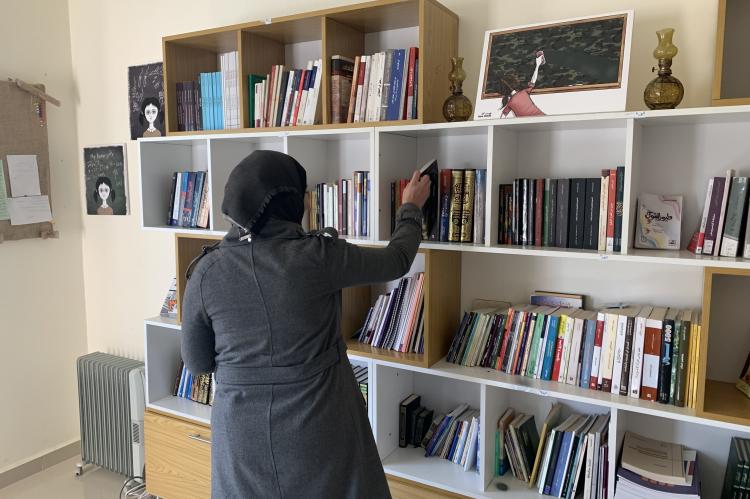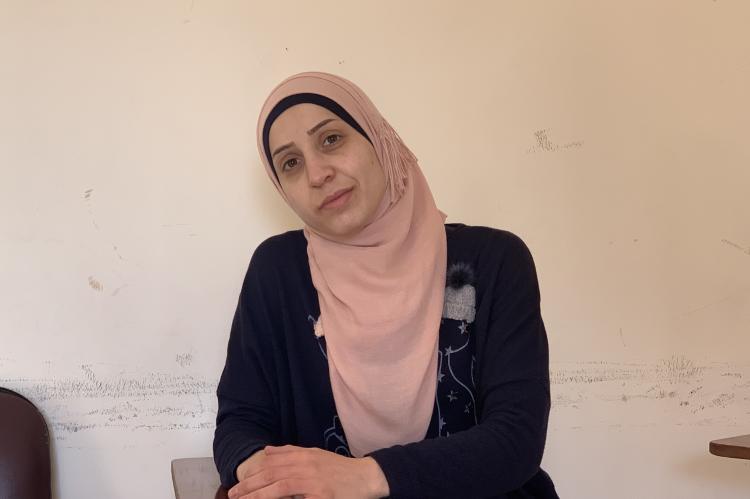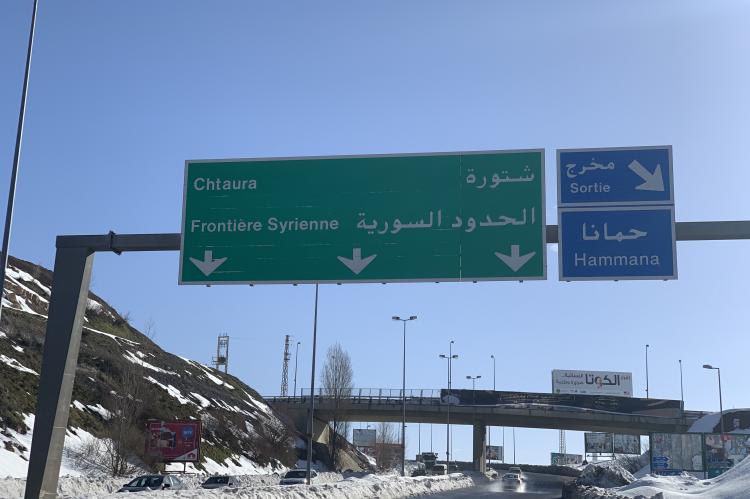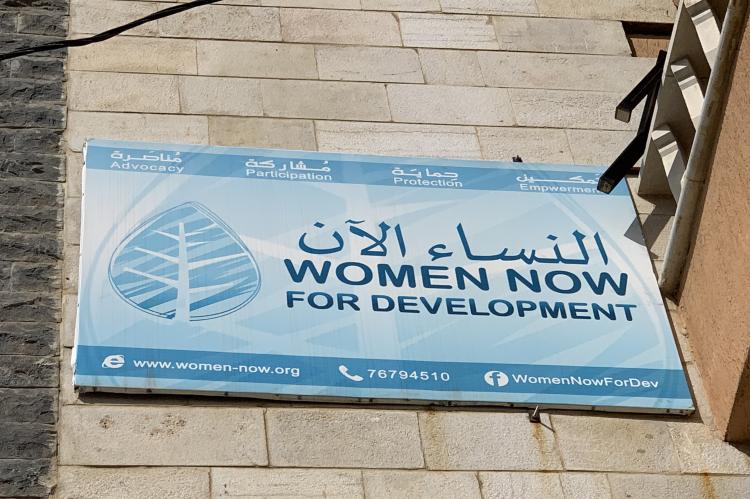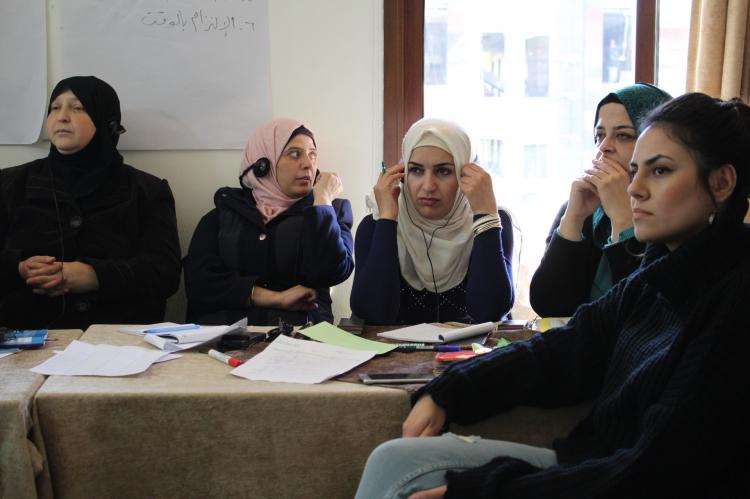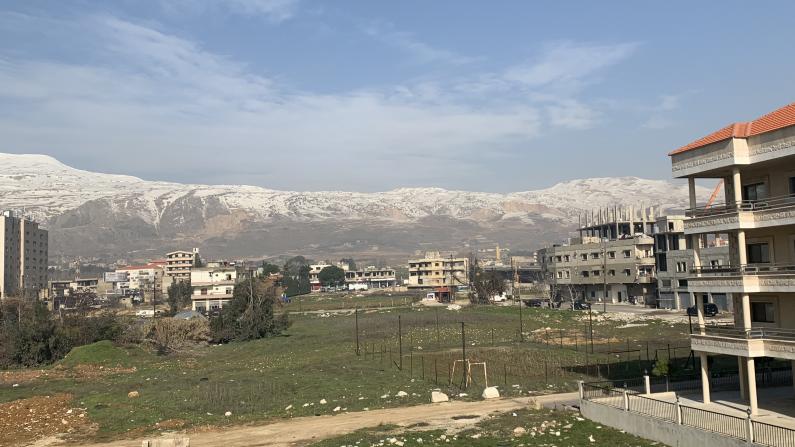
Usually, the centre is busy this time of the day. About 30 women visit the centre every day to attend English or computer classes, use the library, take a first aid course or drink coffee in the kitchen. But "Women Now" has interrupted its normal operation for a few days due to the storm that raged in Lebanon at the beginning of January. The informal shelters of many Syrian refugees did not withstand the heavy rain and snow. Plastic tarpaulins tore and floors were flooded.
Local organizations opened their doors and offered shelter to refugees. Also in "Women Now", 100 people were taken in. "Our landlord was not very pleased at first. But we were able to appease him", says Amani Burhan. A few days ago, the guests moved out again and the staff of the organization are now preparing for the normal daytime operations.
Trust is in focus
"Women Now" is a Lebanese organization with Syrian roots. It works in both countries and focuses on supporting women. The organization works together with "House of Peace" (short: HoPe), a partner of forumZFD. "Women Now" creates a safe place for women where the philosophy of the organisation is built around trust, talking, and listening. "A trusting atmosphere is very important. Only then can we support the women who come to us", says Burhan.
One of the frequent visitors of "Women Now" is Oula Alyan. Four years ago, the 30-year-old Syrian had to flee to Lebanon. Now she is attending some of the various workshops offered in the "Women Now"-centre. In order to promote the leadership qualities of women, the trainings available are teaching human and women's rights, gender issues, as well as negotiation and communication skills.
For Oula Alyan, the women's centre in Chtaura is a place to feel at ease: "I feel no inhibitions and can talk a lot about my experiences and private things." Thanks to the support of the trainers, Oula Alyan was able to attend an additional, more advanced, workshop in Beirut.
'Women Now for Development' also emphasises the importance of education
A huge colourful poster is hanging on the wall of the corridor. On a blue background, Syrian children has painted something that is specific for their home regions - a Roman arch from the Aleppo-area, wheat stalks from the east of the country, a sculpture from the Umayyad Square in Damascus. More children's drawings are hanging in the childcare room, which is provided in order to accommodate the children while their mothers are taking part in the courses.
Not only for Syrians
Khaula Abdelwahid, a Lebanese woman from Baalbek, is teaching one of the many English courses. She explains that her students are Lebanese, Syrian and Palestinian women between the ages of 18 and 45: "Women want to know what their children are learning in English class in school. English is also important in everyday life. Some hope that they can use the language in their work."
Khaula Abdelwadid is a Lebanese who is teaching English to Syrian women in the centre
In the office, Amani Burhan has switched on the stove. Over a cup of tea, the 33-year-old talks about how the organization has adapted more and more to its Lebanese surroundings. Burhan is from Zabadani, a city not far from Damascus. She had to leave her home over two years ago.
The activities of "Women Now" were never exclusively focused on Syrian women, she says. Nevertheless, the participants of the courses were initially mainly Syrian refugees. The employees were also Syrian women, although the nationality was never a criterion for employment. Both have changed now. Two out of the 15 volunteers at the centre are Lebanese. The number of local women participating in the centre's activities has also increased: "Lebanese come to test out what we have to offer, they like it, and they become regulars."
Conflict Sensitivity
The cooperation with HoPe played a decisive role in the increased inclusion of the host community. It is one of the few organizations in Lebanon focusing on Conflict Sensitivity. Because the local and international organizations do not always consider all types of impact their projects and relief measures have, these can unintentionally lead to conflicts. In the HoPe workshops, the representatives of the organizations evaluate the positive and negative impact of their work. They analyse the context in which they work, and learn to deal attentively with occurring conflicts. The participating organisations are also supported in adapting their programs and internal structures to the results of the analysis.
Ali Mosarah works for 'House of Peace'. The 36-year old trainer and programme manager has worked for many years for international humanitarian organizations in the Middle East and Africa. He has seen how well-intentioned projects cause harm to communities, for example when in a crisis situation help is only given to a specific group. The result is resentment from other people who do not receive assistance, leading to inter-group tension and hostility.
His experiences have encouraged him to engage in a Conflict Sensitive-approach. Actually, it's about bringing the principle of "Do-No-Harm" to life. Although this is the guiding principle of all non-governmental organizations in crisis areas, it is not always reflected in practice. Mosarah noted that the vast majority of aid workers in Lebanon and Syria have never heard of Conflict Sensitivity.
The Syrian border is only a few kilometers away from Chtaura
The situation in Lebanon remains fragile
Lebanon is in a particularly fragile situation. According to the UN Refugee Agency, around one million registered Syrian refugees live in Lebanon. Most of them have settled in the borderlands in the north and east, the Bekaa Valley. These areas, among the poorest in the country, have high unemployment. Lack of water and electricity is a part of everyday life.
English teacher Khaula Abdelwahid, from Baalbek, says that many Lebanese in her city are angry with Syrian refugees. They accuse them of working for lower salaries, and taking jobs from the locals. Anyone who implements projects in such an environment must be aware of this situation, and deal consciously with all those involved.
Ali Mosarah and the "Women Now"-team conducted a multi-day workshop on Conflict Sensitivity. First of all, the volunteers analysed the immediate environment, the context in which they work. "We painted a map of our surroundings and thought about with whom we communicate, and with whom we do not. For example, we realized that we had not made contact with Lebanese organizations from our neighbourhood. We have made up for it. Maybe there will be opportunities for cooperation", says Amani Burhan.
Women Now for Development in Chtaura is educating women in participation
Secondly they dealt with the relationship with the city administration: "The mayor of Chtaura visited us. We somehow had an uneasy feeling about it. We did not know how to interpret the fact that he came to visit us and asked ourselves: Why is he doing that? But then we put ourselves in his position and considered what we would have done in his place." These reflections have led to a less tense relationship with the city administration.
"Women Now" also got increasingly involved in the different challenges the women who come to their centre face. It turned out that some residential areas are unsafe. This applies, for example, to the villages east of Chtaura, where the crime rate is high. "We supported them through providing transportation for the women to the centre."
The influence of language
A major topic of discussion in "Women Now" is language and the implicit messages it conveys. The organization used to refer to "Syrian women" in their social media, when communicating about the centre’s activities. "We changed this term to ‘Syrian, Lebanese and Palestinian women’. But other nationalities could feel excluded. So now we only use the term 'women'. Anything else could cause tension."
After the workshop with "House of Peace", the women organization's volunteers made changes to the program planning." When planning our activities, we now ask much more than before about the needs of the women. We used to do this only on a very general level. Now we adapt our activities to their wishes." At the centre there are now intermediate English lessons, not just beginner courses. In the workshops on health, first aid courses were integrated, also upon request of the women. "At first, the donors were opposed it, but we were able to convince them", Amani Burhan explains.
Syrian, Lebanese and Palestinian women come together in the Women Now for Development-centre
"We are emphasising the human aspect. That works." Burhan summarizes the relationship between the Syrian refugees and the Lebanese. However, the peaceful coexistence of the women from the two communities in the "Women Now"-centre cannot be generalized. In everyday life outside the women's centre, the situation is different. Amani Burhan heard many stories about police raids on Syrian businesses in her hometown, Bar Elias, a small town near Chtoura. Oula Alyan talks about the dismissive glances she received during her last trip to Beirut. Because of her clothes, she is recognized as a Syrian.
"The Syrians are under a lot of pressure, daily. For example, Syrians’ shops are closed down, or renewals of their residence permits are refused- even though they have all the necessary papers. That makes them consider returning to Syria", says Amani Burhan. The storm in January, which forced Syrian refugees to leave their shelters, also reinforced some people's idea about going back home. How many actually took this step is not known since there is no reliable data. Confirmed information about the fate of returnees is also lacking. Amani Burhan and Oula Alyan are not considering returning. The risk of being persecuted in Syria is too big.
For Ali Mosarah of House of Peace, the glass of Syrian-Lebanese relations is half full. There are significant tensions between the two sides and political discourses hostile towards refugees, but the situation remains stable: "The nice stories predominate. I could tell you 200 stories of Lebanese helping Syrians or vice versa, but these stories are not the ones being told. A bad story though, sticks in everybody’s mind."
Learn more about House of Peace on their facebook-page, and read about Women Now for Development on their website.
